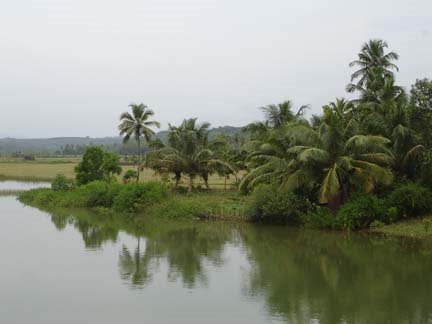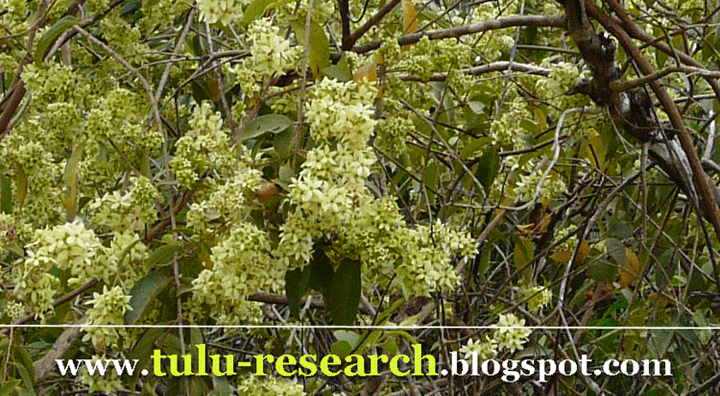The modern interpretation of many of the
ancient place names may not always be considered as perfect or final, because
of the inherent uncertainties involved.
Basically the toponym interpreter should take cognizance of the,
environment, language and culture that prevailed during the time period of
adopting a particular toponym. The uncertainties arise basically due to the
obscure nature of our understanding the history, language and environment and
the timeslot of adoption of such a kind of nomenclature.
Parkala
Let us consider the example of a place name
like Parkala. The village of Parkala, as many are aware, is a small rural place
near the famed town of Manipal in Udupi. Since there are no major ancient
temples in the village there may not be existence of mythological pattern of
history (sthala purāna) associated
with the village of Parkala.
Tulu
Parkala
If you consider the toponym to be a basic Tulu word
then the word analysis would be para+kala, where para usually means the old and the word kala
represents a quadrangle, plot or enclosure,
that may be used for meeting, judgment, entertainment, worship or
combat.
But note: the toponym is Parkala and not Parakala!
It may be difficult immediately to decide whether Parkala means same as Parakala.
Other possible source of meanings
Other possible source of meanings
In case 'par 'in Parkala does not mean 'old' then, some of the other possible explanations for the originally intended meaning by our ancestors for the place name “Parkala” could be one of the following:
1. Parkala (parapu = to flow; stream). Tulu word 'parap(p)u'' means bathing ghat in the riverside (cf.Tulu Nighantu). The
River Swarna flows by the side of this village located near Manipal. ( Thus, possibly “Parkala”=
A quadrangle by the side of river.). This choice appears valid as the Kannada translation of the place name matches with the interpretation. The Kannada translated name 'Harekala' incidentally contains 'hari' which also means to flow.
2. Para (=respectable;
supernatural) + Kala (=place, quadrangle).
A revered place or shrine.
3. Para (= Outside
people; immigrant) + Kala (Assembling Place).
It could have been a colony for immigrants, like ‘Agrahara’ for Brahmins. (Compare with another similar place name,
like “Parampalli”.)
4. Par (ಪರ್) + kala (ಕಲ/ಕಳ): (par
= to drink.) Thus, Parkala could have
been an area earmarked for consuming liquor or intoxicant drinks. Like, an ancient army camping place, where
‘Chakan’ is an indispensable place for food and drinks (See our Post on
Chakan).
5. Parkala ( Bengali/
Munda)= glass, lens, mirror.
6. Parkala ( Hindi)
= (i ) staircase ( सीडि ) ; veranda, square or threshold ( चौकट). (ii) piece of
glass; (iii) cinder (अंगार/ चिंगारी).
Many
Parkalas’
If you go beyond the limits of ancient Tulunadu
you shall find there are quite a many Parkala villages other than the one we
started with. The census of India data for 2011 will enlighten you on the
presence of villages named as Parkala in Telangana as well as in Jharkhand. In
Chattisgarh you can find a Parkal kasba. There may be many more hamlets
carrying the same name in other parts of India.
Pa
to Ha transition
In coastal Tulunadu, the transition of
administrative languages from Tulu to Kannada has been evident in place names
probably coinciding with the suzerainty of Vijayanagara empire, which extended
up to the West Coast.
Thus, we find transition of place names like Perur
to Herur, Perga to Herga and so on especially in the region of Udupi and
Kundapur that centered on the Barkur State of Vijayanagara administration.
In the same vein, we find Harekala (in southern
part of Mangaluru) which probably was the translation of older name Parkala.
Ambiguities
But the interesting thing here is that Harekala
is not an exclusive Kannada word as we find
the toponym Harkala also in West
Bengal.
Thus, it should be noted that the pa- to ha- transition is not exclusive
to Kannada. The distribution of the word in a wider region beyond the general
limits of Dravidian languages renders that the actual meaning of the term par/para/har/hare
in the toponym Parkala remains to be
concluded.
One of the famous religious center (Mutt) in Mysore is known as Parakala Mutta. It is not clear whether
the Parkala and Parakala are related and mutually relevant words. Similarly a high grade calico cloth
produced at Sonargaon, West Bengal during 17th Century was also
known as Parkala.
Meaning of Parkala?
If we think that Parkala has been translated into Harekala, then it may be noted that the meaning assigned to para (=old) in Parkala has not been translated to hale (=old) in Kannada. Again, we are led into confusion of accepting hare as alternate form of hale or a word of unknown or uncertain meaning. (Some may even argue that hare is a version of arey which means rock).
However, choosing from the list of other possible meanings, it seems the term par or hare/hari which means 'to flow', representing a flowing river appears to be more closer to the originally intended meaning. This seems apt as the the place Parkala is located on the bank of River Swarna. Thus the original meaning of the place Parkala would be a quadrangle or enclosure by the riverside.
However, choosing from the list of other possible meanings, it seems the term par or hare/hari which means 'to flow', representing a flowing river appears to be more closer to the originally intended meaning. This seems apt as the the place Parkala is located on the bank of River Swarna. Thus the original meaning of the place Parkala would be a quadrangle or enclosure by the riverside.
Beyond
limits of Tulunadu
As we
have reported in many older posts in this blog, the Tulunadu and parts of
Karnataka, share many of the presently odd sounding place names with Eastern
coast especially Andhra, Orissa West Bengal, Jharkhand and Chattisgarh.
Therefore one cannot argue that the pattern of toponym analogy as mere
coincidence.
Deciphering the ancient tracts of migration as
evident in the distribution of toponyms which reflect the exchange of language, words and culture
would be useful links in understanding our roots. Besides it may be hoped that
the proper and realistic understanding of our roots and the history would go a
long way in forging national integration.
Tailpiece: On Pareeka
‘Pareeka’
is a locale near Parkala, notable for a Naturopathy Hospital. Incidentally, the
term Parik or Pareek also refers to an
ethno-linguist group of Brahmins from Rajasthan and Gujarath. ‘Parikh’ in
Gujarathi means ‘assayer or examiner’ (of diamonds) from Vanik (= Merchant )class. The people of the community usually profess descent from the legendary sage
Parashara.
RV



No comments:
Post a Comment